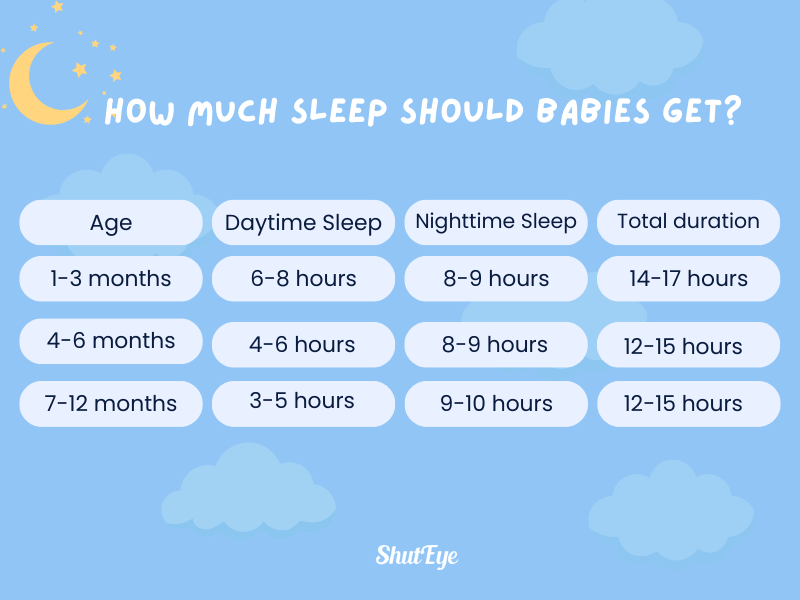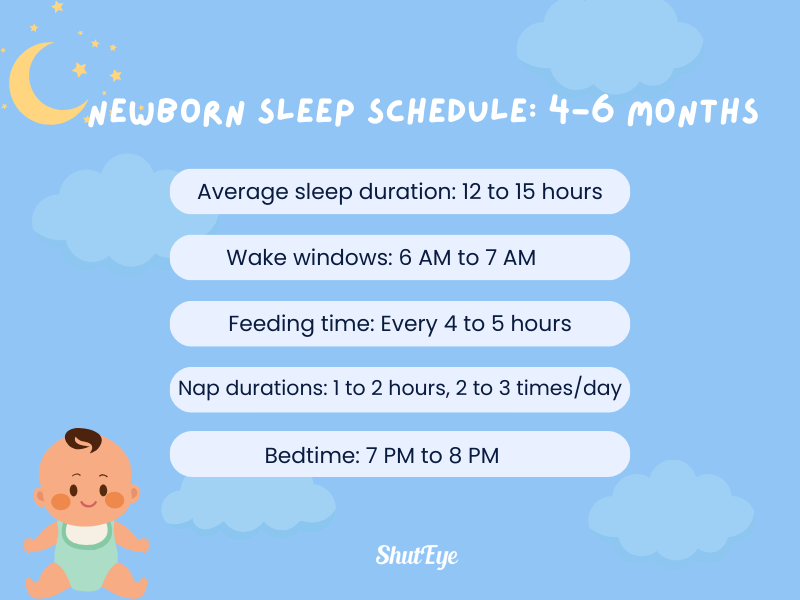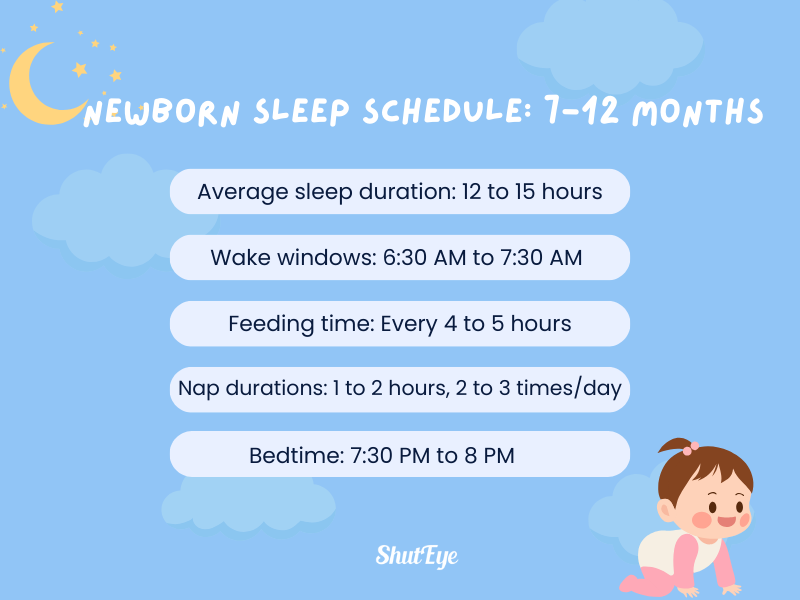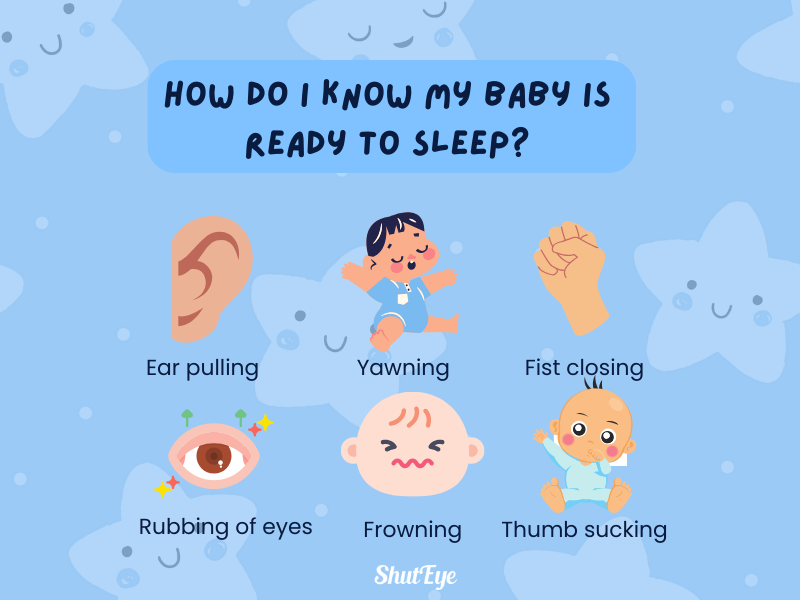


Being a parent is often an exciting yet highly stressful journey. If you thought that all your worries would disappear upon giving birth, you are wrong. Is my baby sleeping enough? Is my baby eating enough?
These are common questions that many parents tend to stress over. Hopefully, with this newborn sleep schedule guide, you will be able to breathe a sigh of relief and understand your baby’s needs better.
A newborn baby usually sleeps for most of the day and night, getting up only when it is time for feeding, diaper change, or cuddles. They do not follow the same sleep-wake cycle as adults do and hence, do not have a set sleep schedule [1].
As a first-time parent, it is difficult to anticipate how long your newborn should sleep or how often they will wake up. You can expect this routine to be a challenge to adapt to, at least until they reach 3 months of age.

Generally, a newborn baby gets between 14 to 17 hours of sleep in 24 hours. They sleep in short bursts, waking up every 2 to 3 hours for feeds [2].
However, this sleep duration and sleep frequency will change based on the baby’s sleep cycles and development.
Here is a general overview of how much sleep newborns need based on age:
| Age | Daytime Sleep | Nighttime Sleep | Total Sleep Duration |
| 1-3 months | 6-8 hours | 8-9 hours | 14-17 hours |
| 4-6 months | 4-6 hours | 8-9 hours | 12-15 hours |
| 7-12 months | 3-5 hours | 9-10 hours | 12-15 hours |
It is a given that any parent would want their baby to sleep well. Here are some baby sleep schedule examples that you can refer to when your baby is from 1 month old to 1 year old.
Don’t be alarmed if your baby does not seem to follow the schedule. The amount of time spent in light sleep, deep sleep, and naps is different for every baby. Babies sleep more if they are going through a growth spurt [3].
Most babies between the ages of 1 to 3 months will sleep between 14 to 17 hours a day. They also nap frequently, needing about 4 to 5 naps— each lasting 30 minutes to 2 hours.
It is normal for your baby to wake up often when they are at this age because of short sleep patterns (each sleep cycle lasting about 40 minutes), hunger, and the need for diaper changes.
Wake windows for 1 to 3-month-old infants: Your baby may wake around 6 AM to 7 AM as the morning sun starts to rise.
Feeding time for 1 to 3-month-old infants: Feeding time should be every 2 to 3 hours.
Nap durations for 1 to 3-month-old infants: Naps can be taken after feeding. Your baby may nap between 30 minutes to 2 hours, after which you can proceed to wake them for feeding.
Bedtime for 1 to 3-month-old infants: Babies this age may start to fall asleep between 8 PM to 9 PM.
Sleep tips for a 1 to 3-month-old baby:
See also: 5 Best Newborn Sleep Sack For Your Litte One

At this stage, a baby will slowly start to transition into a more ‘adult’ sleep cycle. You will find that your child may start to wake less and fall into a deep sleep stage more often through the months.
Babies of this age sleep for an average of 12 to 15 hours a day. As a baby reaches 6 months of age, most of them will tend to sleep longer than 9 hours, waking up occasionally [5].
Wake windows for 4 to 6-month-old infants: Your baby will continue to wake around 6 AM to 7 AM just as when they were slightly younger than this.
Feeding time for 4 to 6-month-old infants: Feeding time is stretched slightly with feeds taking place every 4 to 5 hours.
Nap durations for 4 to 6-month-old infants: Naps may last 1 to 2 hours for 2 to 3 times a day.
Bedtime for 4 to 6-month-old infants: A baby of this age will fall asleep between 7 PM to 8 PM.
Note: This chart is only meant to serve as a guideline. Each baby’s sleep pattern is unique and their needs would vary.
4 to 6 month old baby sleep tips:

Babies that are 7 to 12 months old also need between 12 to 15 hours of sleep in a day. It is also in this period when your baby’s sleep patterns will be like an adult’s.
Your baby will also experience physical, emotional, and social development which can affect their sleep. Separation anxiety is common as they gain more awareness of their surroundings.
Wake windows for 7 to 12-month-old infants: A baby at this age will often wake up between 6:30 AM to 7:30 AM.
Feeding time for 7 to 12-month-old infants: Feeding time is still the same, every 4 to 5 hours.
Nap durations for 7 to 12-month-old infants: Naps may last 1 to 2 hours for 2 to 3 times a day.
Bedtime for 7 to 12-month-old infants: A baby of this age will fall asleep between 7:30 PM to 8 PM.
Note: This chart is only meant to serve as a guideline. Every baby’s sleep schedules are unique and their needs vary.
*Follow the same tips as when your baby was 4 to 6 months old for better sleep at night.

When your baby is ready to fall asleep, there will be recognizable sleep cues to let you know. Some signs that indicate your baby is tired are:
A fussy and crying baby that is difficult to soothe is the most obvious sign that your baby is overtired. It is important to recognize the signs before your baby reaches that point.
See also: 10 Best Sleep Tips for Newborns
Every newborn is different. They all have their own sleeping pattern and needs so you may find that the schedules above may or may not be suitable for your baby. Understanding your baby’s needs and being responsive to those cues can help you to adjust accordingly and ensure that your baby develops healthy sleep habits.
For more newborn sleep tips like this, check out the ShutEye® app. ShutEye® not only helps you to track your sleep cycle but it also offers personalized insights and custom sleep sounds to ensure a peaceful night’s rest.
Ben-Joseph, E. P. (2022) Sleep and Your 4- to 7-Month-Old [online]. Available at: https://kidshealth.org/en/parents/sleep47m.html
Ben-Joseph, E. P. (2022) Sleep and Your 1- to 3-Month-Old [online]. Available at: https://kidshealth.org/en/parents/sleep13m.html
Health Hub (n.d.) Parent Hub: 0-2 Years - Baby Sleep [online]. Available at: https://www.healthhub.sg/programmes/parent-hub/baby-toddler/baby-sleep
Millis, M. (2023) What to know about baby growth spurts [online]. Available at: https://www.babycenter.com/baby/baby-development/baby-growth-spurts_40007276
Raising Children Network (2024) Baby sleep and settling at 3-6 months: tips [online]. Available at: https://raisingchildren.net.au/babies/sleep/settling-routines/helping-babies-sleep-settle-3-6-months
Stanford Medicine (2024) Newborn Sleep Patterns [online]. Available at: https://www.stanfordchildrens.org/en/topic/default?id=newborn-sleep-patterns-90-P02632